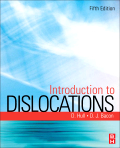Introduction to Dislocations, 5th Edition

Dislocations are defects in the crystal structure of important engineering materials, such as metals, ceramics and semi-conductors, that strongly influence the properties of these materials.
Research on dislocations was intense when the first edition of this classic work was published in the 1960s. By incorporating later developments in subsequent editions whilst retaining a concise, accessible style, Introduction to Dislocations has become established as a key resource for students, graduates and researchers. No other book on the topic is as credible and, with this new edition, as up-to-date.
Introduction to Dislocations is widely recognized to provide the essential knowledge base required for further study, research and technological application in the field. This update brings the book's coverage, references and context in line with the latest developments to ensure it remains a core reference for all those studying and working in the field today.
Key Features
Key features of Introduction to Dislocations include:
- Long-established academic reference by an expert author team, highly regarded for their contributions to the field.
- Uses minimal mathematics to present theory and applications in a detailed yet easy-to-read manner, making this an understandable introduction to a complex topic.
- Unlike the main competition, this new edition includes recent developments in the subject and up-to-date references to further reading and research sources.
https://shop.elsevier.com/books/introduction-to-dislocations/hull/978-0-08-096672-4
Terms
While we only use edited and approved content for Azthena
answers, it may on occasions provide incorrect responses.
Please confirm any data provided with the related suppliers or
authors. We do not provide medical advice, if you search for
medical information you must always consult a medical
professional before acting on any information provided.
Your questions, but not your email details will be shared with
OpenAI and retained for 30 days in accordance with their
privacy principles.
Please do not ask questions that use sensitive or confidential
information.
Read the full Terms & Conditions.